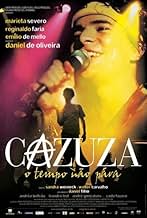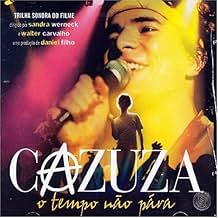IMDb RATING
6.9/10
4.6K
YOUR RATING
The life and times of Cazuza, Brazilian singer/poet/enfant terrible, from his start with rock group "Barão Vermelho", to his death from Aids, in 1990, showing his career, love affairs, and i... Read allThe life and times of Cazuza, Brazilian singer/poet/enfant terrible, from his start with rock group "Barão Vermelho", to his death from Aids, in 1990, showing his career, love affairs, and involvement with drugs.The life and times of Cazuza, Brazilian singer/poet/enfant terrible, from his start with rock group "Barão Vermelho", to his death from Aids, in 1990, showing his career, love affairs, and involvement with drugs.
- Directors
- Writers
- Stars
- Awards
- 23 wins & 18 nominations total
Vitor Hugo
- Bené
- (as Victor Hugo)
- Directors
- Writers
- All cast & crew
- Production, box office & more at IMDbPro
Featured reviews
***** MAY CONTAIN SPOILERS *******
If you're not Brazil and have never lived here, you probably don't know Cazuza. But Brazilian people and lucky ones who lived in this country in the 1980's know this great composer and singer. In 1981 he begun his career as the singer of Barão Vermelho, that soon became one of the most popular Brazilian rock bands. With great heats playing on TV and radio, Cazuza and his band got fans all over the country. In 1985 he decided he wouldn't keep on playing with his mates and kicked out a solo career, that took five years. Cazuza had more success due to his talent and courage to sing everything he wanted. Unfortunately, he also kept on using drugs and with dangerous free sex habits. As a consequence, he got AIDS. Even after the discovery of this terrible disease, he kept on singing and showing no fear of showing the whole country the effects of AIDS. In 1990 he died. This is the story everybody (in Brazil at least) knows. This is what we saw on TV news, magazines and newspapers. The film shows it all in a beautiful, but at the same time strong, way. Daniel Oliveira plays the protagonist in a great way, and physically he really looks like Cazuza. Marieta Severo and Reginaldo Faria, two of the best Brazilian actors, play Cazuza's parents, who never left him alone. Walter Carvalho and Sandra Werneck direct this movie in a remarkably way. Cameras are never totally stopped. There's always some kind of movement, as if the cameramen had the cameras on their shoulders all the time. This gives a flavour of movement, that makes some kind of tense atmosphere.
My Rate 8/10
If you're not Brazil and have never lived here, you probably don't know Cazuza. But Brazilian people and lucky ones who lived in this country in the 1980's know this great composer and singer. In 1981 he begun his career as the singer of Barão Vermelho, that soon became one of the most popular Brazilian rock bands. With great heats playing on TV and radio, Cazuza and his band got fans all over the country. In 1985 he decided he wouldn't keep on playing with his mates and kicked out a solo career, that took five years. Cazuza had more success due to his talent and courage to sing everything he wanted. Unfortunately, he also kept on using drugs and with dangerous free sex habits. As a consequence, he got AIDS. Even after the discovery of this terrible disease, he kept on singing and showing no fear of showing the whole country the effects of AIDS. In 1990 he died. This is the story everybody (in Brazil at least) knows. This is what we saw on TV news, magazines and newspapers. The film shows it all in a beautiful, but at the same time strong, way. Daniel Oliveira plays the protagonist in a great way, and physically he really looks like Cazuza. Marieta Severo and Reginaldo Faria, two of the best Brazilian actors, play Cazuza's parents, who never left him alone. Walter Carvalho and Sandra Werneck direct this movie in a remarkably way. Cameras are never totally stopped. There's always some kind of movement, as if the cameramen had the cameras on their shoulders all the time. This gives a flavour of movement, that makes some kind of tense atmosphere.
My Rate 8/10
This film cannot be seen as a good piece of film as it is. Out of context, it has no special meaning besides the point it constantly tries to make of the clichés we have heard over and over again. That is, gay men taking drugs, having sex with everyone they see and being self-destructive. As it usually happens with Brazilian cinema, this movie doesn't try to break away from the national social basis and only repeats all the beliefs the citizens and foreigners have of the country and its own people. A very sad thing to do, a very bad message to pass. I watched this film remembering my mother telling me how horrible it is when people start smoking joints and end up dying of aids for sharing needles and being promiscuous. That's what everyone goes around saying in Brazil, in sensationalist terms, and this is how this film is presented. It is a true pity that such a good composer and singer had to be pictured in such horrible colours. And worst still that Brazil hasn't learnt how to do something new that will challenge the people to expand their way of thinking into new areas.
How can we know if this was a superficial picture of Cazuza? Could we ever separate the man from the myth? The movie did show him as being a spoiled kid, self destructive and with no boundaries and at the same time, his passion and ability to make poetry out of anything - politics, love, relationships and even his imminent encounter with death. For whoever expected the movie to be a political statement, I understand the disappointment. The movie focused on his legacy (probably what he'd proud of the most): his music. Excellent work from main actor Daniel de Oliveira impersonating Cazuza - especially towards the end, it was amazing, very touching. I liked the way it ended, not falling for an easy soap opera melodrama.
I'd recommend it - great movie.
I'd recommend it - great movie.
It was very disappointing because I wanted to know about who was Cazuza, why he was writing those songs and saying how bad was his family, his class and the evil Brazil.
All I've discovered was a spoiled child that want to do everything he intend to. There were no repercussion about his real personal life and how he became friend of the Barao Vermelho's members again after their separation and discussions.
After all, its pointless to watch it if you have no idea about who is that guy, that Brazilian singer... The last part of the movie should't longer, it was the most dramatic part of his life and that kind of thing works on movies biographies. Maybe his mother didn't want to watch it or reaffirm the disease his is remembered for.
All I've discovered was a spoiled child that want to do everything he intend to. There were no repercussion about his real personal life and how he became friend of the Barao Vermelho's members again after their separation and discussions.
After all, its pointless to watch it if you have no idea about who is that guy, that Brazilian singer... The last part of the movie should't longer, it was the most dramatic part of his life and that kind of thing works on movies biographies. Maybe his mother didn't want to watch it or reaffirm the disease his is remembered for.
As a Brazilian, I grew up listening to Cazuza, where his songs marked my childhood and that of many Brazilians. I didn't know much about his personal life and I believe that most Brazilians didn't know much either, besides the fact that he was bisexual.
The film came up with the proposal to, precisely, tell about his personal life until his musical rise. The proposal is very interesting and reading it like that, nothing could go wrong, as there were many mistakes in my view.
The script at the beginning of the film is extremely fast and confusing in many moments, in some scenes you wonder who this character is and what he is doing there and what is his importance to the story. His musical rise was left in parallel, there was nothing to show that, he just started to progress his career out of the blue.
The actor who played Cazuza is excellent, his acting was wonderful, but his lines were full of figures of speech and ready-made effect phrases that Cazuza himself would speak, but not all the time in any dialogue he had with someone.
I believe the film would have had a lot of potential if it hadn't failed at these points, if the script hadn't been less confusing and shown more clearly its rise in musical life to its decline with AIDS.
The film came up with the proposal to, precisely, tell about his personal life until his musical rise. The proposal is very interesting and reading it like that, nothing could go wrong, as there were many mistakes in my view.
The script at the beginning of the film is extremely fast and confusing in many moments, in some scenes you wonder who this character is and what he is doing there and what is his importance to the story. His musical rise was left in parallel, there was nothing to show that, he just started to progress his career out of the blue.
The actor who played Cazuza is excellent, his acting was wonderful, but his lines were full of figures of speech and ready-made effect phrases that Cazuza himself would speak, but not all the time in any dialogue he had with someone.
I believe the film would have had a lot of potential if it hadn't failed at these points, if the script hadn't been less confusing and shown more clearly its rise in musical life to its decline with AIDS.
Did you know
- TriviaCazuza's manager Zeca passed away in the same date he did, exactly twenty years later.
- ConnectionsReferenced in Mussum, Um filme do Cacildis (2019)
- SoundtracksCirco Voador
Written by Guto Graça Mello
Details
- Runtime
- 1h 38m(98 min)
- Color
- Sound mix
- Aspect ratio
- 1.85 : 1
Contribute to this page
Suggest an edit or add missing content































